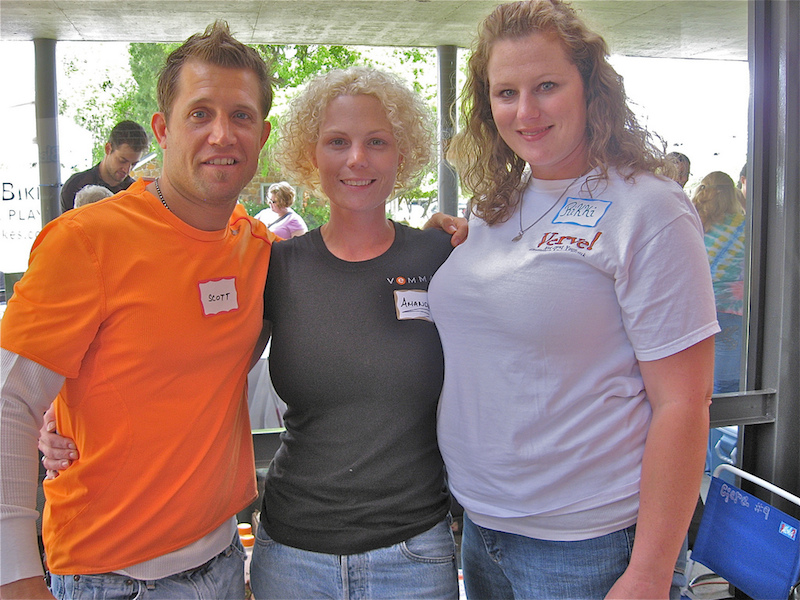By Laura Rena Murray November 10, 2014

Promotional Shoot for one of Vemma’s “nutritional” drinks, called Verve, taken in August 2013. © Stephanie Cosenza
In mid-October, I published the first installment of an investigative report for Al Jazeera America about a private multilevel marketing company called Vemma Nutrition Company that billed itself to desperate and unwitting youth as a revolutionary alternative to minimum wage jobs. I was able to show that Vemma, which is in the process of expanding internationally, is very likely a pyramid scheme. It bilks vulnerable affiliates out of their own money to prop up sales of its “insanely healthy” liquid nutrition formula. That formula is the subject of an FDA report that cited multiple health complaints filed by Vemma’s consumers, who experienced severe allergic reactions, vomiting, diarrhea and hospitalizations.
Reporting on companies that are privately held like Vemma can be challenging given they are not required to file financial statements with the Securities and Exchange Commission. Journalists often rely on the companies themselves to provide information about their profits and revenue growth. But when a company is on the defensive and doesn’t want to speak to reporters, it requires some legwork and ingenuity to dig up the numbers.
By the time I landed in Arizona, where Vemma is headquartered, the company had already started to retreat from the spotlight and rebrand its messaging, having received a spate of negative media attention about its recruitment practices. (The FDA report on its liquid nutrition formula had not yet been a focus of media attention.) My attempts to speak to or meet with the CEO, Benson Keith (BK) Boreyko, were continuously stonewalled. The crisis PR firm the company had hired told me Boreyko was unavailable to meet with me because he was traveling. I suspected this was not the case because he was actively tweeting multiple times a day as a “nearby user.” (I applied filters to my searches on Twitter, where “nearby” is defined as in the same city or neighborhood). I also spotted his car in the company parking lot on multiple occasions during my stay. The company’s aversion to letting me talk to Boreyko piqued my curiosity and inspired me to dig deeper.

Vemma advertisement. © Vemma Corp.
Documents and Inside Sources
I knew that finding Vemma employees who would talk was going to be a challenge. Most of the students I had approached before arriving in Arizona expressed concerns that there would be retribution if they continued speaking to a reporter, saying they had been warned by higher ups at Vemma. Afraid of subjecting their families to lawsuits, many went silent. After all, in order to become a company affiliate, individuals are required to sign an agreement promising “that they will not disparage Vemma, other Affiliates, Vemma products, services, Compensation Plan or Vemma employees or officers.” If they break this agreement, affiliates “have to pay us for any loss or damage that Vemma might suffer,” according to the online document.
During my stay in Arizona, I traveled between Phoenix, Scottsdale, and Tempe, where Vemma is headquartered, looking for sources of information. (The three cities are clustered together, about a 15-minute drive from one another.)
Documents, it was clear, would be imperative for this investigation, so I started piecing together a document trail. I was able to obtain lawsuits filed against the company by former affiliates and vendors from Phoenix’s U.S. District Court on PACER, which you can search for free in the courthouse, and pulled filings from the Arizona Corporate Commission.
I also asked every barista, waitress, and young-looking person I met in Scottsdale, Phoenix and Tempe about the company. Many of them were students at Arizona State University, which has campuses in Tempe and Phoenix. The upperclassmen among them immediately identified Vemma as a pyramid scheme – my first clue that the company might be targeting an even younger, and more naïve, demographic than I had realized.
I wanted to see the Vemma manufacturing factory itself, which is separate from its headquarters, and requested entry, but was promptly denied access. I thought perhaps I could get in anyway, but first I had to find it. I tried to tailgate the chartered buses hired to drive Vemma’s visiting affiliates from company headquarters to the factory to obtain the address, but was waylaid by traffic lights stationed before the highway onramp. Instead, I waited to intercept the returning affiliates at the hotel adjacent to the headquarters, which is currently located on a desolate industrial stretch, facing a construction site.
Using this approach, I found one affiliate who was happy to boast about his business. The former military officer chain-smoked cigarettes with his girlfriend, her black eye still visible beneath her make-up, while he talked about the big parties the couple liked to host. He claimed Vemma’s products were a great hangover cure, but cautioned that the drinks might make me vomit at first because my body wasn’t “used to it.” He promised to text me details for an upcoming recruitment meeting, the only way to gain access since the meetings are purposefully scheduled at the last minute and are no longer advertised on public forums.
I subsequently attended multiple recruitment meetings, where the majority of attendees I met were still in high school or newly arrived college freshman. When several of the youth offered me cans of the energy drink, I was again cautioned that they might make me sick. The multiple warnings inspired additional research, which led me to the FDA report on consumer complaints about the company. Finally, in late August, I was able to see Boreyko in action. Some teen affiliates invited me to Vemma’s Latino Launch at the company’s headquarters, where Boreyko spoke to a skeletal crowd, promising “God is going to bless Vemma with a large Latino business.” (I did not approach Boreyko, deciding at this point it was better to fly under the radar.)
Still hoping to locate the actual factory address, I checked the Economic Development and Planning offices in Scottsdale (where Vemma was formerly headquartered) and Tempe, to no avail. Later, I was able to assemble documents from the Maricopa County Recorders Office, records for dozens of companies incorporated by Boreyko and his siblings, which showed interchanging directorships and addresses between them. I also found a report from an FDA inspection of Vemma’s facilities and discovered the company used a “manufacturing contractor.” When I looked up the address of the contractor, I found the factory – listed as one of the companies incorporated and headed by Boreyko.
On my last day in Phoenix, I visited the Attorney General’s Office to request fraud complaints filed against Vemma but was told they were unavailable to the public. I had anticipated the denial considering Boreyko’s contributions to Arizona’s attorney general races, including $4,000 last September to Tom Horne, who campaigned on a platform dedicated to fighting consumer fraud and prosecuting businesses accused of wrongdoing.

Scott, Amanda and Rikki, manning the Vemma booth, Wellness Expo, Addison, Texas, April 2009. © Tony Cecala
Doing the Math
Getting brushed off by the Attorney General’s Office left me plenty of time to traipse over to the Municipal Court to comb through more documents. This is where I discovered Boreyko had gotten divorced last year. As any journo knows, divorce records can be a goldmine. The file included a copy of Boreyko’s pre-nup agreement with his ex-wife and a copy of Boreyko’s 2003 tax return. In addition to listing Boreyko’s personal assets, the document also revealed that Boreyko claimed deductions for commercial real estate that was purchased under an obscure LLC. In essence, Boreyko was collecting hundreds of thousands of dollars in rent by leasing the property to his other companies, including Vemma.
Since Boreyko was contesting the child support payments requested by his ex-wife for their six children, the file also included a child support worksheet that listed his 2013 income at $12 million; a dramatic increase from the $219,000 dollars he reported on his 2003 tax return, the year before he incorporated Vemma. In comparison, 78% of the company’s affiliates earned less than $2,000 last year on average, according to Vemma’s 2013 U.S. Income Disclosure statement.
The numbers contained in this 2013 U.S. Income Disclosure statement were the only ones the company was willing to share. The single page listed the annual averages of affiliates’ earnings. When I tried to do the math, I realized the numbers didn’t add up. If the company managed to retain the 105,251 active affiliates it claimed for 2013, the payments for all affiliates – according to the percentage breakdown for each rank – would average more than $500 million in total. More than double Vemma’s total reported revenue last year of $221 million. Either there was a very high turnover rate among affiliates, or the numbers of affiliates or their incomes must have been inflated.
Additionally, in order to remain active, affiliates are required to purchase or sell at least $90 worth of product each monthly billing cycle. If the company did manage to retain 105,251 active affiliates in 2013, that would have generated upwards of $113 million in revenue, which would suggest – at a very modest minimum – that more than half of Vemma’s revenue is generated by sales of product to the company’s affiliates themselves. If true, it would qualify Vemma as a pyramid scheme according to Federal Trade Commission standards.
Indeed, one Kentucky mother told me her 19 year-old son lost several thousand dollars over the course of a year before leaving the company. “He became very secretive and defensive… and talked about quitting school,” she said. “Vemma was stealing his future and his personality. This company is predatory. They target young people… utilize peer pressure, social pressure, and brain washing techniques.” She described Boreyko as “just evil” and said she resents the time the company “stole” from her and her son.
“This experience has reinforced to me the importance of the work that you (the press) do. With this kind of situation, the only remedy is to shine the light on it,” she said. “I can assure you that you have made someone’s life better by warning them.”
When Boreyko finally agreed to a 15 minute phone call, monitored by interjecting PR agents, he argued that “some people think a pyramid scheme is not a bad thing,” and said the challenge would be “to get better with our messaging.”
This entry was posted on Monday, November 10th, 2014 at 6:00 am. It is filed under Behind the Story and tagged with Benson Keith Boreyko, FDA, Phoenix, Scottsdale, Tempe, Tom Horne, Vemma Nutrition Company. You can follow any responses to this entry through the RSS 2.0 feed.
Comments are closed.
